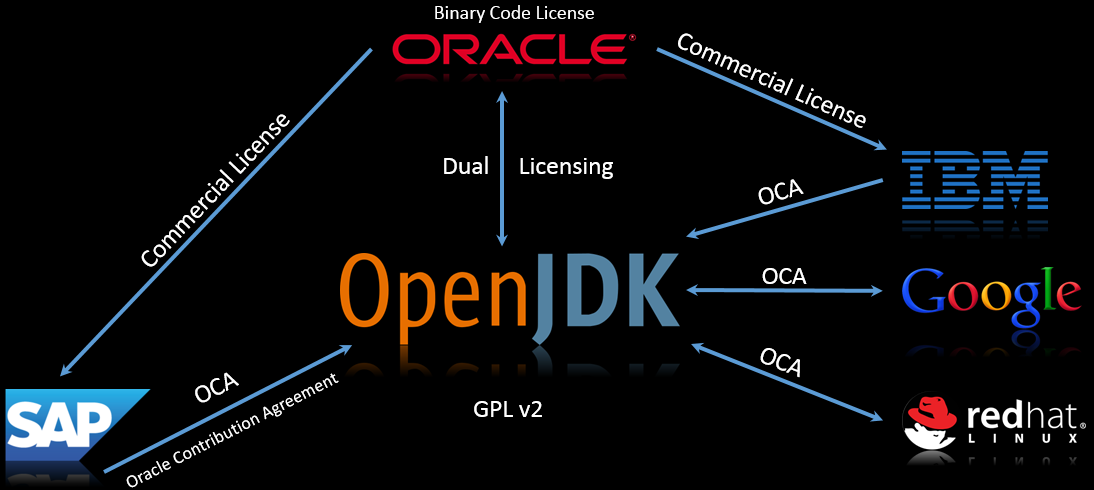and
in Corporate Environments
Volker Simonis, SAP / volker.simonis@gmail.com
Disclaimer
- I am not a lawyer!
- I do not provide legal advice!
The OpenJDK Project
- Open Source implementation of Java SE
- Reference implementation for Java SE 7, 8, 9, ..
- Licensed under GPLv2 (with Classpath exception)
- Collaboration space for different implementers:
- RedHat, SAP, IBM, Google, Intel, Twitter, Azul
- Playground for Java SE related projects:
- Coin, InvokeDynamic, Lambda, Nashorn, ...
- Jigsaw, Graal, Panama, Value Types, ...
- Does not provide binaries - just source code!
The OpenJDK License
- GNU General Public License, version 2
- HotSpot files (i.e. everything under
hotspot/except JNI headers) - GNU General Public License, version 2, with the Classpath Exception
- Class Library (i.e. everything under
jdk/)
OpenJDK Distributions/Binaries
- Every Linux distribution comes with its own OpenJDK packages:
- RedHat/Fedora: based on the IcedTea project
- Also supports "exotic" platforms like arm32/ppc32/s390/mips using the Zero port
- Maintains its own patch queue
- Debian/Ubuntu (maintains own patch queue)
- Azul Zulu:
- OpenJDK binaries for Linux/Windows/Mac and embedded platforms
- Integrated into Microsoft Azure
- AWS and Docker (may use distribution specific packages)
- Adopt OpenJDK has a continuous build server
"Closed" OpenJDK Distribuitions
- Google internally uses a custom OpenJDK build
- Contributions to the OpenJDK (Parallelize the CMS full GC phase, ppc64le, jsr-166)
- Twitter internally uses a custom OpenJDK build
- Contributions to the OpenJDK (mostly GC fixes)
- OpenJDK port for Elbrus (russian VLIW CPU)
- Loongson/Mips64: has recently published a jdk8 repository
Distribuitions using the OpenJDK class library
- Possible because it is licensed under GPLv2 plus Classpath exception.
- IKVM.NET: Java implementation for Mono/.NET
- JamVM: a small, interpreter-only Java VM
- Supported as alternative JDK on many Linux distros (Debian, Ubuntu, Fedora)
- Eclipse OMR: open source version of IBM's J9
The Oracle JRE/JDK
- Oracle's Java SE implementation
- Based on OpenJDK sources
- Plus Oracle specific/proprietary extensions and addons
- Different font renderer (T2K vs. FreeType)
- FlightRecorder & MissionControl
- Browser plugin (now deprecated)
- JavaFX
- Licensed under the Oracle Binary Code License Agreement for Java SE
Oracle Java SE License
- Oracle Binary Code License Agreement for Java SE
- Contains "Field of use restriction"
- Only for "General Purpose Desktop Computers and Servers"
- Doesn't cover industrial control systems, mobile telephones and handheld devices, ..
- Doesn't cover "Commercial Features" (e.g. Flight Recorder, Mission Control) in production
Other Java implementations
Proprietary:
- IBM J9
- SAP JVM
- HP JDK
- Azul Zing
- Excelsior JET
- aicas JamaicaVM
- ...
Free:
- Apache Harmony
- GNU gcj
- Jikes RVM
- ...
OpenJDK and the Java™
- You are not allowed to call it Java™ (or Java™ compatible) because:
- "Java" is a registered trademark
- You don't get access to the Technology Compatibility Kit (TCK)
- Accessing the TCK
requires the signing of the
OpenJDK Community TCK License Agreement (OCTLA)- Only for OpenJDK or "substantially derived" projects under an "open source" license
- OCTLA forbids disclosing TCK information to non-OCTLA licensees
- OCTLA is no trademark license!
- "OpenJDK" can be used according to the "OpenJDK Trademark Notice"
The Oracle Contribution Agreement (OCA)
- Copyright and patent sharing agreement with regard to your contribution
- Simple dual licensing model
- Both, you and Oracle, can treat your contribution as if they were the sole owners
- Oracle guarantees to always publish any contribution under a suitable
Free Software Foundation (FSF) or Open Source Initiative (OSI) approved license.
The Dual Licensing Model

The Java Enhancement Process (JEP)
- Collect, review, sort, and record proposals for enhancements to the JDK
- JEP 1: JDK Enhancement-Proposal & Roadmap Process defines the process
- Simpler than a Java Community Process (JCP) Java Specification Request (JSR)
- Specification changes still require a JSR
- The JEP process is still dominated by Oracle:
- requires endorsement and funding by Group Leads
- The OpenJDK Lead
(appointed by Oracle) ultimately
decides which JEPs to include into the Roadmap.
- Still attractive for “implementation enhancements” (i.e. new Ports, GCs, JITs, ..)
OpenJDK Bylaws
- The "constitution" of the OpenJDK project
- Define OpenJDK Groups, Projects and Roles
- Define the Governing Board
which manages
the structure and operation of the OpenJDK community- Chair (appointed by Oracle): Georges Saab
- Vice-Chair (appointed by IBM): John Duimovich
- OpenJDK Lead (appointed by Oracle): Mark Reinhold
- At-Large Member (elected by OpenJDK Members): Doug Lea, SUNY Oswego
- At-Large Member (elected by OpenJDK Members): Andrew Haley, RedHat
OpenJDK Organisation
- Participants: individuals who subscribed to an OpenJDK mailing list
- Contributors: Participants who signed the OCA
- Groups (currently 20)
- consist of Group Members
and a Group Lead
- Group Members elect new Group Members from Contributors
- sponsor Projects
- consist of Group Members
and a Group Lead
- Projects (currently 54)
- produce artifacts (code, documentation, whole JDK releases)
- have code repositories, mailing lists and possibly web content
- consist of Authors,
Committers,
Reviewers
and a Project Lead
- Project Leads appoint Authors from Contributors
- Committers elect new Committers from Authors